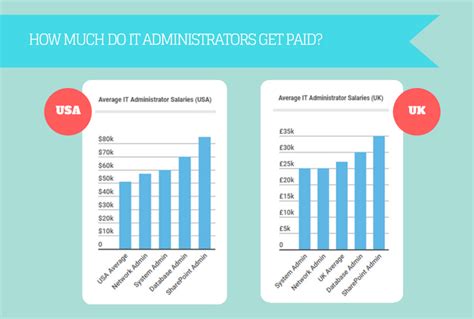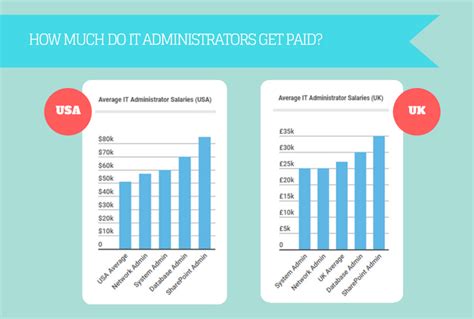In the digital-first world, Information Technology (IT) Administrators are the essential architects and guardians of an organization's tech infrastructure. This critical role not only offers a dynamic and challenging career path but also provides a competitive salary and strong job security. If you're considering a future in IT, understanding your potential earnings is a crucial step.
So, what can you expect to earn as an IT Administrator? While the national average provides a strong starting point, your salary can vary significantly based on your experience, location, and specialization. This guide breaks down the IT Administrator salary, drawing on the latest data from authoritative sources to give you a clear picture of your earning potential.
What Does an IT Administrator Do?

Before diving into the numbers, let's briefly define the role. An IT Administrator is responsible for maintaining and managing an organization's computer systems and networks. Think of them as the digital backbone of a company, ensuring that all technology operates smoothly, securely, and efficiently.
Key responsibilities often include:
- Installing, configuring, and maintaining servers, network hardware, and software.
- Managing user accounts, permissions, and access to resources.
- Implementing and overseeing security measures to protect data.
- Performing regular system backups and disaster recovery operations.
- Troubleshooting and resolving technical issues for employees.
- Upgrading systems and processes to improve performance and efficiency.
It’s a role that demands a blend of technical expertise, problem-solving skills, and a proactive mindset.
Average IT Administrator Salary

The compensation for an IT Administrator is highly competitive, reflecting the vital nature of their work. According to the most recent data from the U.S. Bureau of Labor Statistics (BLS), the median annual wage for network and computer systems administrators was $90,520 in May 2022.
However, a median figure only tells part of the story. Salary aggregators provide a more granular view of the typical salary range:
- Salary.com reports that the salary range for an IT Administrator typically falls between $73,205 and $89,190, with the potential for senior-level professionals to earn significantly more.
- Glassdoor lists the average total pay for an IT Administrator in the United States at approximately $84,000 per year, combining a base salary and additional compensation like bonuses.
- Payscale notes a base salary range from $52,000 to $95,000, highlighting the broad spectrum from entry-level positions to those held by highly experienced professionals.
Taken together, a newly qualified administrator might start in the $55,000 to $70,000 range, while experienced or specialized administrators can easily command salaries exceeding $100,000 to $125,000 or more.
Key Factors That Influence Salary

Your specific salary as an IT administrator isn't set in stone. Several key factors can dramatically impact your earning potential. Understanding these variables will help you strategically navigate your career for maximum financial growth.
### Level of Education
While hands-on experience is paramount in IT, education provides the foundational knowledge employers seek. Most IT Administrator positions require at least an Associate's degree in a related field, but a Bachelor's degree in Information Technology, Computer Science, or Management Information Systems is increasingly the standard and can lead to higher starting salaries.
Furthermore, industry-recognized certifications act as a powerful salary booster. They validate specific, in-demand skills. Key certifications that can increase your market value include:
- CompTIA Network+ / Security+: Excellent foundational certs.
- Cisco Certified Network Associate (CCNA): For those focusing on networking.
- Microsoft Certified: Azure Administrator Associate: Essential for cloud-focused roles.
- Red Hat Certified System Administrator (RHCSA): For those specializing in Linux environments.
### Years of Experience
Experience is arguably the most significant factor in determining your salary. As you gain expertise and prove your ability to manage complex systems, your value to an employer skyrockets.
- Entry-Level (0-2 years): In this phase, you are learning the ropes and handling more routine tasks. Expect a salary in the range of $55,000 to $70,000.
- Mid-Career (3-8 years): With solid experience, you can manage more complex projects and work with greater autonomy. Salaries typically rise to the $70,000 to $95,000 range.
- Senior-Level (8+ years): Senior administrators often lead teams, design system architecture, and manage critical infrastructure. Their expertise commands salaries well over $100,000, with many earning upwards of $125,000, especially with specializations.
### Geographic Location
Where you work matters. Salaries for IT administrators vary widely across the country to reflect differences in the cost of living and local demand for tech talent. Major metropolitan areas and tech hubs typically offer the highest salaries.
For example, IT administrators in cities like San Jose, San Francisco, New York City, and Seattle will command significantly higher salaries than the national average. Conversely, salaries in smaller cities and rural areas will likely be closer to or slightly below the national median, though the lower cost of living can often offset this difference.
### Company Type
The type and size of the company you work for also play a role.
- Large Tech Corporations: Companies in the tech sector (like Google, Microsoft, or Amazon) often pay top-dollar to attract the best talent and offer robust benefits packages.
- Finance and Healthcare: These industries rely heavily on secure and reliable IT infrastructure, and their administrators are often well-compensated due to the critical nature of their systems.
- Small to Medium-Sized Businesses (SMBs): Salaries may be slightly lower than at large corporations, but these roles can offer broader responsibilities and faster opportunities for growth.
- Government and Education: While base salaries may be more modest, these sectors often provide excellent job security, generous retirement plans, and a better work-life balance.
### Area of Specialization
Generalist IT administrators are always needed, but specializing in a high-demand area is the fastest way to accelerate your career and salary growth. As technology evolves, certain skills become more valuable.
Key specializations that command premium salaries include:
- Cloud Administration: With the massive shift to cloud computing, administrators skilled in platforms like Amazon Web Services (AWS), Microsoft Azure, or Google Cloud are in extremely high demand.
- Cybersecurity Administration: As cyber threats grow more sophisticated, companies are willing to pay a premium for administrators who can harden systems, monitor for threats, and manage security infrastructure.
- Network Administration: Deep expertise in complex network architecture, including LAN/WAN, firewalls, and routers, remains a highly valued specialty.
- Database Administration (DBA): Managing and securing the vast amounts of data that companies collect is a critical function that often comes with higher pay.
Job Outlook

The future for IT Administrators is bright and stable. According to the BLS Occupational Outlook Handbook, employment for network and computer systems administrators is projected to grow 2 percent from 2022 to 2032.
While this growth rate is about as fast as the average for all occupations, it translates to a significant number of job openings. The BLS projects about 23,800 openings for administrators each year over the decade, primarily arising from the need to replace workers who transfer to different occupations or exit the labor force. This indicates a consistent and enduring demand for skilled professionals to manage increasingly complex IT environments.
Conclusion

A career as an IT Administrator offers a rewarding path with a competitive and scalable salary. While a national median salary of around $90,520 is an excellent benchmark, your personal earnings will be shaped by your own ambition and strategic decisions.
To maximize your salary potential, focus on these key takeaways:
- Build a Strong Foundation: Pursue a relevant degree and never stop learning.
- Get Certified: Invest in industry certifications that align with your career goals.
- Gain Experience: Seek out roles that challenge you and allow you to take on more responsibility.
- Specialize: Develop deep expertise in a high-demand area like cloud computing or cybersecurity.
- Be Strategic: Consider how location and company type align with your financial goals and lifestyle.
For those with a passion for technology and problem-solving, the role of an IT Administrator is more than just a job—it's a gateway to a prosperous and future-proof career.
